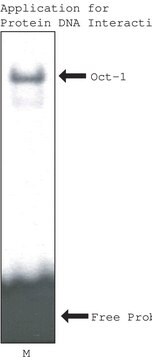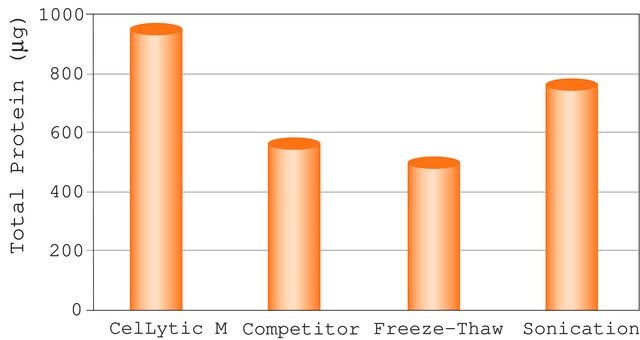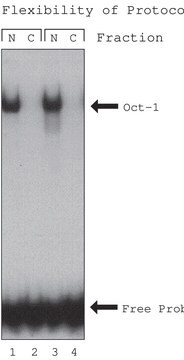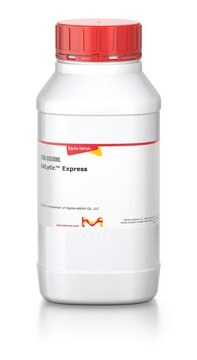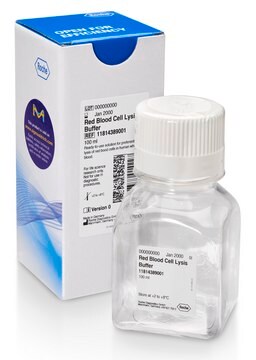MCL1
Mammalian Cell Lysis Kit
Synonym(s):
Cell Lysis Reagent
Sign Into View Organizational & Contract Pricing
All Photos(1)
About This Item
UNSPSC Code:
12352200
NACRES:
NA.56
Recommended Products
usage
kit sufficient for 250 extractions (100 mm tissue culture plates)
Quality Level
technique(s)
immunoprecipitation (IP): suitable
shipped in
dry ice
storage temp.
−20°C
Application
The product contains all required reagents for the disintegration of mammalian cells and tissue for subsequent analysis of protein targets. Cellular proteins are stabilized during lysis and are suitable for immunoassays, immunoprecipitation, affinity purification and other functional assays.
Mammalian cell lysis kit was used to test the role of vascular endothelial growth factor (VEGF) receptor-1 and its ligand VEGF-B in motor neuron degeneration.
Mammalian cell lysis kit was used to test the role of vascular endothelial growth factor (VEGF) receptor-1 and its ligand VEGF-B in motor neuron degeneration.
Features and Benefits
- The kit can be used to prepare cell lysis buffer and other modified buffers
- The kit enables the researcher to change the buffer′s components to obtain maximum efficiency for a specific protein
Components
The mammalian cell lysis kit is composed of solutions to be mixed and used for lysis of adherent cells, non-adherent cells, and tissues. It contains buffer, detergents, NaCl and protease inhibitor cocktail solutions.
Kit Components Also Available Separately
Product No.
Description
SDS
- P8340Protease inhibitor cocktail 2.5 mLSDS
Signal Word
Danger
Hazard Statements
Precautionary Statements
Hazard Classifications
Acute Tox. 4 Inhalation - Acute Tox. 4 Oral - Aquatic Chronic 3 - Eye Dam. 1 - Skin Irrit. 2 - STOT SE 3
Target Organs
Respiratory system
Storage Class Code
10 - Combustible liquids
Flash Point(F)
Not applicable
Flash Point(C)
Not applicable
Choose from one of the most recent versions:
Already Own This Product?
Find documentation for the products that you have recently purchased in the Document Library.
Customers Also Viewed
Jingfang Gao et al.
Cancer cell international, 14(1), 72-72 (2014-10-04)
Transforming growth factor beta (TGF-β) plays major roles in tumorigenesis by regulating cell growth, epithelial-to-mesenchymal transition (EMT), migration/invasion and metastasis. The epithelial markers E-cadherin, claudin-3 and claudin-4, commonly decreased in human adenocarcinomas are actually up regulated during ovarian carcinogenesis. In
L Martyniszyn et al.
Polish journal of veterinary sciences, 16(1), 25-32 (2013-05-23)
Autophagy is a self-degradation process of cellular components. It plays both antiviral and pro-viral roles in the life cycle of different viruses and the pathogenesis of different viral diseases. In this study, we evaluated autophagy induction in splenocytes of ectromelia
Shintaro Nakao et al.
The American journal of pathology, 178(4), 1913-1921 (2011-03-26)
Vascular adhesion protein-1 (VAP-1) contributes to inflammatory and angiogenic diseases, including cancer and age-related macular degeneration. It is expressed in blood vessels and contributes to inflammatory leukocyte recruitment. The cytokines IL-1β and vascular endothelial growth factor A (VEGF-A) modulate angiogenesis
Molecular imaging reveals elevated VEGFR-2 expression in retinal capillaries in diabetes: a novel biomarker for early diagnosis.
Sun D, Nakao S, Xie F, et al.
Faseb Journal (2014)
Shintaro Nakao et al.
Investigative ophthalmology & visual science, 54(6), 3830-3836 (2013-04-13)
Inflammation and immune cells regulate choroidal neovascularization (CNV) and could become therapeutic targets in age-related macular degeneration (AMD). Lymphangiogenesis is a key component of various inflammatory diseases. Whether lymphangiogenesis and lymph node-mediated immunity are involved in the pathogenesis of AMD
Our team of scientists has experience in all areas of research including Life Science, Material Science, Chemical Synthesis, Chromatography, Analytical and many others.
Contact Technical Service


